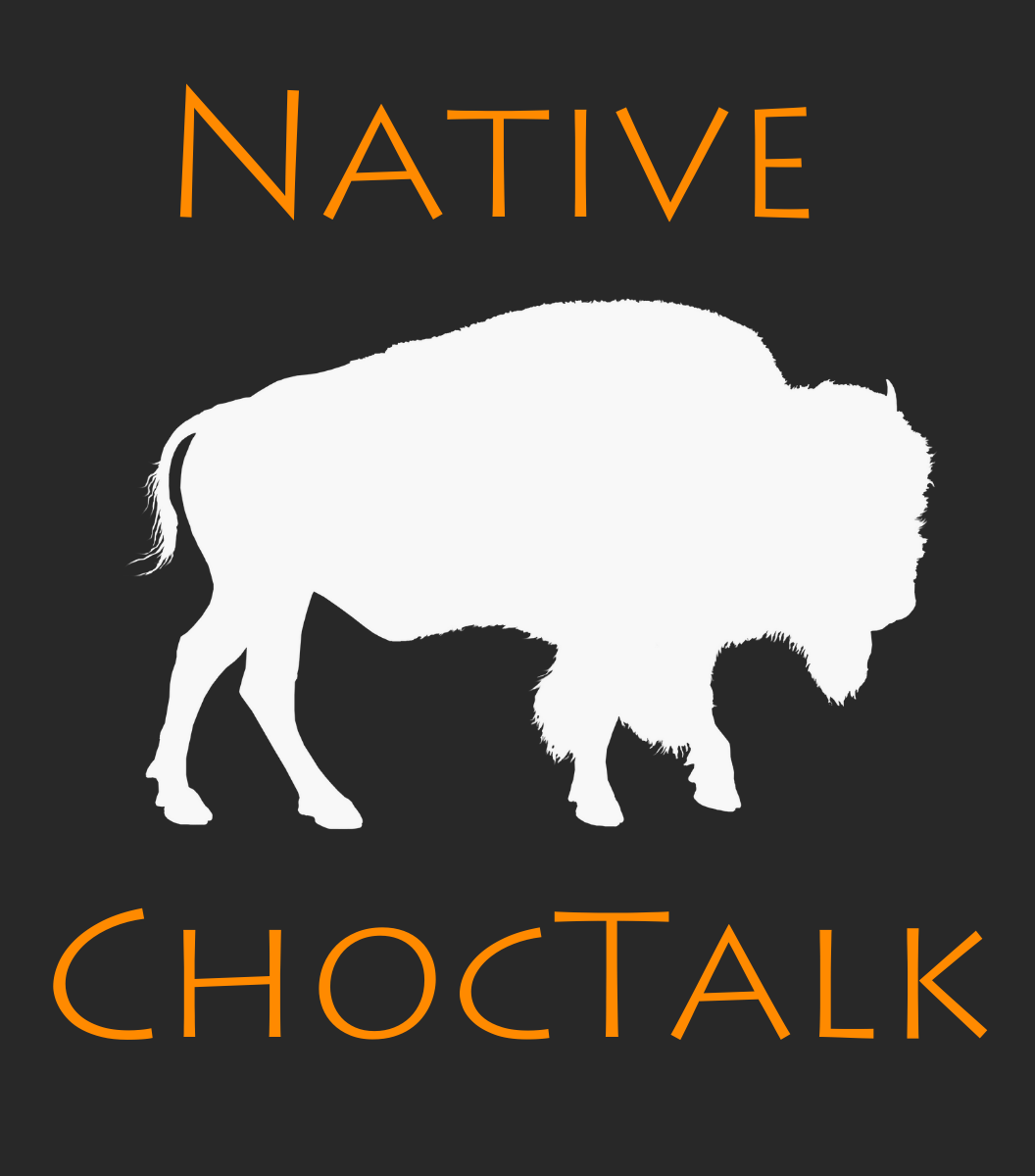Episodes
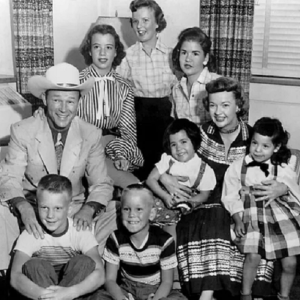
Wednesday Mar 22, 2023
Wednesday Mar 22, 2023
Have you ever heard the famous song, “Happy Trails to You”? Do you know who wrote and performed it?
In part one of this episode, we met the lovely Dodie Rogers (Choctaw), adopted daughter of the legendary “King of the Cowboys”, Roy Rogers (also Choctaw) and his talented wife, Dale Evans, who wrote the aforementioned song. Together they performed “Happy Trails to You” many times over. Even to this day, some of the younger generations are familiar with the piece – and thus the Rogers legend lives on.
Here in Part 2, Dodie continues to share the inspiring, yet heartbreaking story of the Rogers family – a family filled with love bursting at the seams, breaking social norms, changing perspectives on autism, and paving the way for future adoptive families.
You may need to grab your Kleenex box for this one, because as you’ll hear, this family faced one loss after another. And yet, their faith in God remained strong, while their family drew closer through every single challenge.
You’ll also hear about:
- Roy and Dale’s 9 children and their interesting stories
- The inspiring, yet humorous story about how Dodie was adopted
- The Chicki Wicki Choctaw song, written for Dodie by her mom (you’ll also get to hear the song)
- My own personal theory about why Dale started pushing Dodie to learn more about her heritage
Stay tuned for part 3 coming up next!
Special thanks to Anadarko Heritage Museum for pulling some photos of Roy, Dale and Dodie Rogers and their visit to Anadarko!
Check Out:
Cheryl Rogers: https://www.cherylrogers.com/
Sons of the Pioneers: https://sonsofthepioneers.org/
Anadarko Indian Expo: https://www.facebook.com/AmericianIndianExposition
Native ChocTalk Facebook page: https://www.facebook.com/nativechoctalkpodcast
All Podcast Episodes: https://nativechoctalk.com/podcasts/
#dodierogers #choctawnationofoklahoma #royrogers #daleevansrogers #dalerogers #happytrailstoyou #anadarko #anadarkooklahoma #cityofanadarko #saveouranadarkoheritagemuseum #anadarkoheritagemuseum #adravance
#nativechoctalkpodcast #nativechoctalk #rachaelellenyoungman #rachaelyoungman #Choctaw #chahta #nativeamerican #AmericanIndian #nativepodcast

Wednesday Mar 22, 2023
Wednesday Mar 22, 2023
Have you ever heard the famous song, “Happy Trails to You”? Do you know who wrote and performed it?
In part one of this episode, we met the lovely Dodie Rogers (Choctaw), adopted daughter of the legendary “King of the Cowboys”, Roy Rogers (also Choctaw) and his talented wife, Dale Evans, who wrote the aforementioned song. Together they performed “Happy Trails to You” many times over. Even to this day, some of the younger generations are familiar with the piece – and thus the Rogers legend lives on.
Here in Part 2, Dodie continues to share the inspiring, yet heartbreaking story of the Rogers family – a family filled with love bursting at the seams, breaking social norms, changing perspectives on autism, and paving the way for future adoptive families.
You may need to grab your Kleenex box for this one, because as you’ll hear, this family faced one loss after another. And yet, their faith in God remained strong, while their family drew closer through every single challenge.
You’ll also hear about:
- Roy and Dale’s 9 children and their interesting stories
- The inspiring, yet humorous story about how Dodie was adopted
- The Chicki Wicki Choctaw song, written for Dodie by her mom (you’ll also get to hear the song)
- My own personal theory about why Dale started pushing Dodie to learn more about her heritage
Stay tuned for part 3 coming up next!
Special thanks to Anadarko Heritage Museum for pulling some photos of Roy, Dale and Dodie Rogers and their visit to Anadarko!
Check Out:
Cheryl Rogers: https://www.cherylrogers.com/
Sons of the Pioneers: https://sonsofthepioneers.org/
Anadarko Indian Expo: https://www.facebook.com/AmericianIndianExposition
Native ChocTalk Facebook page: https://www.facebook.com/nativechoctalkpodcast
All Podcast Episodes: https://nativechoctalk.com/podcasts/
#dodierogers #choctawnationofoklahoma #royrogers #daleevansrogers #dalerogers #happytrailstoyou #anadarko #anadarkooklahoma #cityofanadarko #saveouranadarkoheritagemuseum #anadarkoheritagemuseum #adravance
#nativechoctalkpodcast #nativechoctalk #rachaelellenyoungman #rachaelyoungman #Choctaw #chahta #nativeamerican #AmericanIndian #nativepodcast
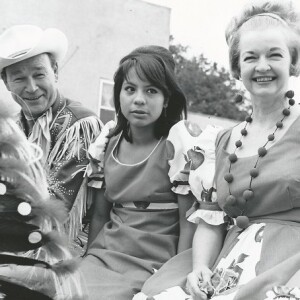
Wednesday Mar 22, 2023
Wednesday Mar 22, 2023
The town: Anadarko, Oklahoma. The year: 1967. Hundreds of onlookers, both locals and those from elsewhere (even from around the world) lined the streets of the little town.
The 36th annual Indian Expo was to kick off as usual, with a parade featuring Kiowa, Comanche, Apache, Fort Sill Apache, Ponca, Pawnee, Delaware, Cheyenne, Arapaho Caddo, Osage, Sac, Fox, Otoe-Missouri, Wichita, and up to 50 other tribes proudly singing, drumming and dancing their way in their regalia down Main Street.
As every year, a Native celebrity was selected as “Indian of the Year” and in 1967, the Choctaw “King of the Cowboys”, Roy Rogers was the grateful recipient. There he rode, cowboy hat and all, in a convertible, along with his cowgirl wife, Dale Evans adorned in an apple-print dress. Seated between the two was a young girl, also wearing a dress with apple print.
The girl’s name was Mary Little Doe or “Dodie” for short, and I had the honor of visiting with Dodie (Choctaw) to hear her story in this 3-part series. Listeners, this is one you do not want to miss!
In this episode, you’ll hear about:
- The surprising story of Dale Evans’ firstborn son
- Roy Rogers and Dale Evans - their early life, careers, heartbreak in the love department prior to meeting each other, and finally their love story
- Roy Rogers’ trips to children’s hospitals with his horse, Trigger who would climb the stairs to see the kids
- The hilarious story of Roy and Dale’s wedding in Oklahoma
- Anadarko, Ok (my hometown) and Horace Poolaw and Robert Goombi Jr’s connection to Dodie and her parents
Stay tuned for parts 2 and 3 coming up next!
Check Out:
Cheryl Rogers: https://www.cherylrogers.com/
Sons of the Pioneers: https://sonsofthepioneers.org/
Anadarko Indian Expo: https://www.facebook.com/AmericianIndianExposition
Native ChocTalk Facebook page: https://www.facebook.com/nativechoctalkpodcast
All Podcast Episodes: https://nativechoctalk.com/podcasts/
#dodierogers #choctawnationofoklahoma #royrogers #daleevansrogers #dalerogers #happytrailstoyou #anadarko #anadarkooklahoma #anadarkoheritagemuseum #saveouranadarkoheritagemuseum #adravance
#nativechoctalkpodcast #nativechoctalk #rachaelellenyoungman #rachaelyoungman #Choctaw #chahta #nativeamerican #AmericanIndian #nativepodcast
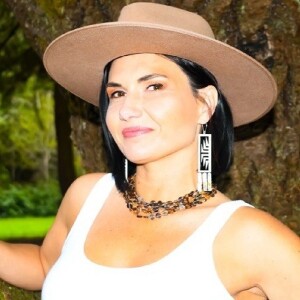
Monday Mar 13, 2023
Monday Mar 13, 2023
Meet Linda Cooley (Yurok tribe), CEO of Mad River Brewing Company in beautiful Blue Lake, California!
And look out, world – because this American Indian CEO is out to help her tribe and the planet too.
After profitability, Linda set out to put a portion of Mad River Brewing funds to good use by helping her Yurok Nation and the land in the area. For instance, their Undammed Seltzer promotes the removal of dams in Native country. This effort resulted in the largest undamming in history, with hopes of restoring the salmon spawning grounds back to their original glory. Mad River also partners with California State Parks for good causes so take a listen to hear more!
We all know there is great sensitivity around substance abuse in our Native American population, and I took this factor into consideration when contemplating this episode. Linda herself experienced the detrimental effects of her father’s addiction, and she determined to utilize her work in the beverage industry to bring awareness to the topic, while also doing good for her tribe and community.
In this episode, you’ll also hear about:
- Linda’s family and ancestral stories
- How Linda got started in the industry
- Tourism being an economic driver in Native country
- The Yurok tribe and the challenges the brewery is trying to help solve
- Mad River Brewing’s intertribal partnerships
- Linda’s first pitch with Mad River Brewery’s partner, the San Francisco Giants
- The brewery’s gold-winning brews
Mad River Brewing is family and dog-friendly (yay!), has live music and some of the best BBQ on the planet!
Linda is on a mission to do good in an unexpected way, with results that are actually working. Her strong leadership skills, determination to make change, and care for her tribe and surroundings is a legacy many can only hope to leave behind.
Yakoke, Linda for all you’re doing and for making Indian country proud – cheers to you!
Please consider supporting Mad River Brewing by liking and sharing their page at: https://www.facebook.com/madriverbrewing
Website: https://www.madriverbrewing.com/.
Special thanks to Justin Chester of @tepacompanies for the introduction!
Native ChocTalk Facebook page: https://www.facebook.com/nativechoctalkpodcast
All Podcast Episodes: https://nativechoctalk.com/podcasts/

Wednesday Mar 08, 2023
Wednesday Mar 08, 2023
This is the story of the resurrection of a tribe who had lost its sovereignty and ultimately, its hope. It’s the story of a retired elder who had a vision and devoted his remaining years to bringing the tribe back to its glory.
It’s also the story of a young new Chairman who led a tribe from corrupt and chaotic leadership to flourishment and victory.
Today, you’ll hear the inspiring story of Andrew (Dru) Alejandre, Tribal Chairman of the Paskenta Band of Nomlaki, and Board Chairman of Tepa LLC.
(“Chairman” to the Paskenta is equivalent to the title, “Chief” in other tribes.)
In this episode you’ll hear about:
- Chairman Dru’s ancestor, Andrew Freeman, and listen to a fascinating recording of him speaking in his Nomlaki tongue
- The 300-member Paskenta band of Nomlaki Indians and their reservation in Corning, California
- Paskenta Brewery and Distillery in the Rolling Hills Casino
- The unlawful termination of the tribe and its restoration in 1994, due to the vision and determination of Chairman Dru’s grandpa, Everett Freeman – spoiler alert, Indian taco sales were a contributor to the cause
- How Chairman Dru set out to bring corrupt tribal leaders to justice. We’re talking a story of private jets and lavish trips with funds stolen from the tribe, culminating to a cyber-attack on the casinos and the need for armed guards – stuff you typically only see in the movies.
- The tremendous growth of tribal commerce now that the proper leadership is in place.
And speaking of - shout out to Justin Chester of the Paskenta Band of Nomlaki Indians-owned Tepa Companies, who was instrumental in introducing me to Chairman Dru. Yakoke, Justin!
Tepa provides construction, engineering, environmental technology and more. Preference is given to American Indian applications, so check them out! @tepacompanies https://www.tepa.com/
Chairman Dru honors his grandpa, Everett Freeman’s legacy by leading with wisdom and strength, while also exemplifying humility. Here is a leader that should not be underestimated. And here is a tribe whose sovereignty was regained and whose determination will not be shaken. Not bad for a man with a vision, and an Indian taco sale or two that helped make it all happen.
Paskenta Band of Nomlaki Indians Facebook Page: https://www.facebook.com/paskentabandofnomlakiindians/photos
Native ChocTalk Facebook page: https://www.facebook.com/nativechoctalkpodcast
All Podcast Episodes: https://nativechoctalk.com/podcasts/
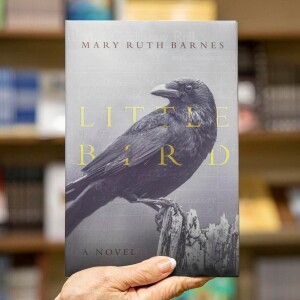
Thursday Mar 02, 2023
Thursday Mar 02, 2023
“I tossed my hair, my braids glowing in the sunlight. I walked my horse forward, recalling Papa’s words, often said in a most authoritative tone. ‘Get off that pony and walk in the wildflowers, Little Bird. Touch the flowers and feel their petals. They are soft, like feathers. Touch the bark of the trees. Their bark runs in circles, like our lives. The tree grows roots and spreads leaves over the earth. The lines of the bark tell many stories of our ancestors. It is a time for you to remember and enjoy the beauties of God’s land. Get off your horse, Little Bird.’ I would be mesmerized by his words. I looked up to see my three favorite crows on a branch above. They took off, leading the way home. Their feathers glistened in the sun, like my hair.”
In today’s episode, you’ll hear the true story of Esther McLish, told by Chickasaw/Choctaw/Cherokee Author, Mary Ruth Barnes from her award-winning book, “Little Bird”. I was so intrigued by this story that I stayed up nearly all night to finish it – it truly is a must-read!
Check out this beautiful Little Bird trailer: https://mbarnes.faso.com/video/7545
You’ll hear about Esther’s relationship with the crows that always seemed to have a message for her, the encounters with the Comanches who lived in Reck, how Esther would travel multiple times to challenge the Dawes Commission, and her heartbreaking journey of much loss, while maintaining her enduring strength and spirit.
Mary Ruth also shares with us the story of the pecan trees on her property, what Chihawa lowa means, and the inside scoop of her ancestral stories.
“In the light of the moon our silent ancestors walked, moving among us, giving us hope and truth. The truth of their ancient promise is not made with their words, but with the lives of those who have experienced the past. Please keep researching.” Those were Mary Ruth’s beautiful words at the end of our visit, and I couldn’t agree more.
Rumor also has it there’s a sequel coming out, so as for me, I’ll be ready for another all-nighter to read more about Esther’s life! Check out “Little Bird” at:
Chickasaw Press: https://chickasawpress.com/Books/Little-Bird.aspx
Amazon: https://tinyurl.com/2sek8xd8
And at First Americans Museum in Oklahoma City!
Mary Ruth’s Website: https://www.maryruthbarnes.com/
Facebook Page: https://www.facebook.com/mary.ruth.barnes
Native ChocTalk Facebook page: https://www.facebook.com/nativechoctalkpodcast
All Podcast Episodes: https://nativechoctalk.com/podcasts/
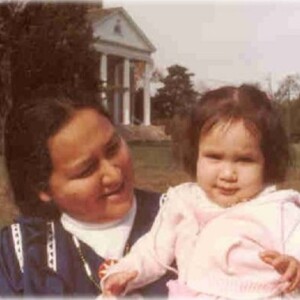
Thursday Dec 08, 2022
Thursday Dec 08, 2022
“Indian Makes Attempt to Kill”. That’s the newspaper article heading I mentioned a few years back in the Facebook group, “Indian Territory and Oklahoma History” in order to share about my Uncle Cicero Coley shooting through the window of his white guardian’s house in an attempt to kill him for stealing his land allotments.
I had come to what I thought was the end of my years of research about my Coley family members and I hoped that perhaps this last-ditch attempt might spur some interest. Wouldn’t you know, it worked! A distant cousin of mine reached out to me and introduced me to another cousin, uncovering some missing pieces to my family story puzzle.
(I’m still looking for more Coley family members so if you know of any Choctaw Coleys, please reach out to me!)
Tracing lineage and finding the history and stories of our American Indian ancestors is quite the challenge. But today my guest is here to bring you (and me) some hope. Meet my guest, Gwen Takes Horse, a Genealogist at Choctaw Nation of Oklahoma who’s here to help us understand how to trace our Native roots!
The information Gwen shares is not just for Choctaws – it can apply to several other tribes. And she also has some good tips for us in general that can apply to anyone.
Take a listen, y’all and feel free to share your family stories with us if you’d like – we love to hear them!
If you’re Choctaw, the Choctaw Nation Genealogy Department can be reached by emailing genealogy@choctawnation.com or 800-522-6170 (ask for the Genealogy Department).
Check out the group I mention in the episode: Indian Territory and Early Oklahoma History, 1800 - 1957: https://www.facebook.com/groups/687213838053719
Tracing your Native American roots:
National Indian Law Library: https://narf.org/nill/resources/roots.html
Ancestry.com Research: https://support.ancestry.com/s/article/Researching-Native-American-Ancestors
Dawes rolls: https://www.okhistory.org/research/dawes
American Indian Records & Resources: https://www.okhistory.org/research/americanindians
Ancestry: https://www.ancestry.com/
Newspapers: https://www.newspapers.com/
Fold3: https://www.fold3.com/?group=1
Family Tree: https://www.familytree.com/
Native ChocTalk Facebook page: https://www.facebook.com/nativechoctalkpodcast
All Podcast Episodes: https://nativechoctalk.com/podcasts/
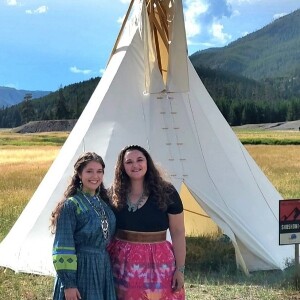
Sunday Dec 04, 2022
Sunday Dec 04, 2022
In season 2, episode 10, I interviewed Composer, Jerod Impichchaachaaha’ Tate about his upcoming and unprecedented opera, “Shell Shaker, a Chickasaw Opera”, the first opera ever written in the Chickasaw language.
And now I’d like to introduce you to 2 award-winning Native opera singers who you’ll find performing in that upcoming opera, February of 2023 at Mount Holyoke College in South Hadley, MA
- Kirsten C. Kunkle (Muskogee) is a Spinto Soprano, Composer, and Artistic Director and Co-Founder of the Wilmington Concert Opera. Listen here https://www.youtube.com/watch?v=-lfDoSR6Jkg
- Kate Raquel Morton (Cherokee) recently graduated from Oklahoma City University and is a Lyric Mezzo-Soprano. Listen here https://www.youtube.com/watch?v=bjCNN-3UuaQ
As someone who used to sing opera myself, I suggested we 3 share our favorite opera picks for someone who’s just getting their feet wet in the genre (search on YouTube for the following):
Kirsten’s Picks:
- Opera: Amahl and the Night Visitors by Gian Carlo Menotti
- Opera: La Boheme by Giacomo Puccini
- Opera: Carmen by Georges Bizet
Kate’s Picks:
- Opera: Le nozze di Figaro by Wolfgang Amadeus Mozart with Isabel Leonard as Cherubino
- Opera Singer: Jessye Norman
Rachael’s Picks:
- Aria (song): Nessun dorma from Turandot by Giacomo Puccini, sung by Luciano Pavarotti
- Opera Singer: Beverly Sills
In this episode, you’ll hear about:
- Intermountain Opera Bozeman: https://www.intermountainopera.org/
- Kate’s foil fencing, Cherokee language speaking, guitar playing, the fact that she’s an “Okie from Muskogee” and the one thing she cannot do
- Kirsten and Kate’s own Muskogee and Cherokee family histories
- Baby Diva (a force to be reconned with)
- Yellowstone’s 150 year anniversary in which Kate sang and Kirsten wrote and performed a piece called “Reclaim the Land”.
To learn more, check out:
- Kirsten: https://www.wilmingtonconcertopera.com/
- Kate: https://www.kateraquelmorton.com
- Jerod:https://www.facebook.com/jerodtate
Yakoke, y’all!
Native ChocTalk Facebook page: https://www.facebook.com/nativechoctalkpodcast
All Podcast Episodes: https://nativechoctalk.com/podcasts/
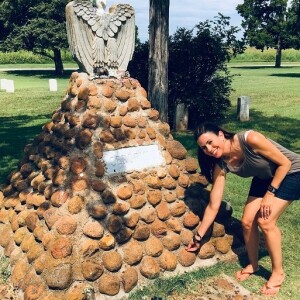
Saturday Dec 03, 2022
Saturday Dec 03, 2022
Part 3 of 3
"I should never have surrendered. I should have fought until I was the last man alive." These are the words spoken on the deathbed of probably the most well-know Native American warrior in history, known as Geronimo.
Some considered him a warrior, and many viewed him as a “sell-out, while others thought of him as a popular Native “character”, representative of all Indians in North America.
I must admit, until I met Author (and retired PhD Physicist), W. Michael Farmer, I underestimated the significant warrior skills of Geronimo. Now I have an entirely new respect for this Apache fighter.
In this episode of Native ChocTalk, you’ll learn about:
- The Chiricahua Apache
- Geronimo’s incredibly monumental warrior skills
- The lesser-known story of the little girl, Trinidad and her encounter with Geronimo
- Geronimo’s friendship with Quanah Parker
- The warrior’s quest to be set free to go “home”
- Skull & Bones Society, and the true-or-false controversy over Geronimo’s remains
Check out W. Michael Farmer’s website where you can find the 3 books we cover in this episode: https://wmichaelfarmer.com/
- “The Odyssey of Geronimo, Twenty Three Years a Prisoner of War”
- “Trini! Come!: Geronimo’s Captivity of Trinidad Verdin”
- “The Iliad of Geronimo”
Yakoke, Michael for sharing your research and expertise!
Native ChocTalk Facebook page: https://www.facebook.com/nativechoctalkpodcast
All Podcast Episodes: https://nativechoctalk.com/podcasts/
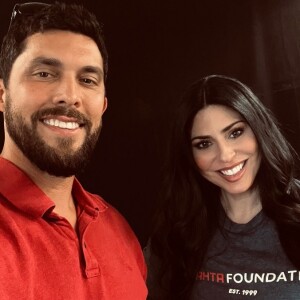
Friday Nov 25, 2022
Friday Nov 25, 2022
“Whatever high crimes and mass deaths and lasting pain can be attributed to the perpetrators of genocide on innocent people, the truth is, we must forgive. And what of the Choctaw-Irish connection? We cannot blame the people standing before us for the mistakes their ancestors made. The wrong we are attempting to right in this volume is ignorance. Ignorance of the truth about the Irish Potato Famine, and the cruelty and deaths that resulted from the Choctaws who were forced on the Trail of Tears.
We forgive, for that is how we lighten the burden and allow our own lives to proceed; but we will never forget. And why? So it will never happen again. That is our hope, our wish, our prayer. May the tragedies of our peoples never happen again. Our gift, the Choctaw Gift to the Irish, is a gift of love. Love and respect for you, your children, your husbands, wives, your ancestors, those buried and those hovering about. We send you blessings and hope that the spirit of joy will shine upon you every day of your life – and beyond.”
Those are the writings of Choctaw Author, Tim Tingle in the book, “Famine Pots: The Choctaw-Irish Gift Exchange, 1847-Present” by LeAnne Howe and Padraig Kirwan, which entails a collection of 15 essays written by both Irish and Choctaws (such as Tim and others), about the beauty of the bond between the Irish and the Choctaw.
Today’s episode is one to celebrate – it’s Native ChocTalk’s 50th episode! But more importantly, this year (2022) is one of commemoration and contemplation, as it’s the 175th anniversary of the Choctaw gift to the Irish in which they sent funds for food during Ireland’s deadly famine.
Some of the conversations in today’s episode are difficult to hear. My guest, Seth Fairchild of the Chahta Foundation and I talk about the realities and suffering of the Irish Famine. But you’ll also hear about the beauty of kindred spirits that were born out of the kindness of strangers, and the bond that resulted from a small gift presented by those who were also suffering.
You’ll also learn about:
- The origin of the potato and its introduction to Ireland
- How and why the Irish famine began
- The grave mistreatment of the Irish
- What the Choctaws felt and did upon hearing the news of the famine in Ireland
- Why funds were sent to the Irish, despite the Choctaw facing hardships themselves
- The Choctaw-Irish connection and similarities that go back for centuries
- The Chahta Foundation and the Choctaw-Ireland Scholarship in which you’ll hear from Claire Green Young on her experience as a Choctaw college student in Ireland
- Alex Pentek’s monument, Kindred Spirits (a tribute to the Choctaw for their kindness)
“This contemporary moment calls on us to make a fresh commitment to the universality of human rights and to the common humanity of all. Ireland has a lengthy history of humanitarian engagement, strongly influenced by our experiences of famine and of emigration. Our humanitarian action is therefore shaped in many ways by a tragic history, but it is rooted in values that remain relevant in a contemporary world – solidarity, community, democracy, justice, freedom, and respect for human rights and equality. They are the values which must continue to guide us as we navigate our future direction as citizens of an interconnected world.”
- President, Michael D. Higgins, “Famine Pots: The Choctaw-Irish Gift Exchange, 1847-Present”
I’d like to dedicate today’s 50th episode to the people of Ireland. The suffering of your ancestors will never be forgotten. Wishing peace and blessings to you and your descendants. And may our people’s kindred spirits live on for centuries to come.
Information:
- Choctaw-Ireland Scholarship Programme: https://tinyurl.com/5n7kvzmc
- Chahta Foundation: https://chahtafoundation.com/
- “Famine Pots: The Choctaw-Irish Gift Exchange, 1847-Present” https://tinyurl.com/mrxc8zm7
Native ChocTalk Facebook page: https://www.facebook.com/nativechoctalkpodcast
All Podcast Episodes: https://nativechoctalk.com/podcasts/

